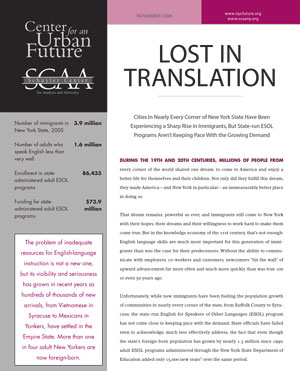Over the past four years, CUF has repeatedly argued that limited English skills among the city's immigrant workforce are both a barrier for countless New Yorkers to advance in their careers and a constraint on New York's economic competitiveness. In several reports and commentaries, we have detailed that just a fraction of the 1.3 million working age adults in the five boroughs with limited English proficiency are enrolled in publicly-funded ESOL classes and urged policymakers to view ESOL programs as a crucial human capital investment that will pay significant dividends for the city's economy in the long run.
In his State of the City Speech last week, Mayor Bloomberg forcefully embraced many of our findings and recommendations. "The job market can be particularly tough for entry-level workers and those with limited English skills, and that means many immigrants have been hit particularly hard by the national recession," said the Mayor. "So we'll expand job-preparation classes in English-as-a-second-language for an additional 5,000 of our newest New Yorkers. We'll increase summer job placements for students who are learning English." While this only begins to address the need, we are gratified that the mayor is committed to bolstering ESOL programs.
Mayor Bloomberg also announced new efforts to support immigrant-run businesses, saying "We'll help immigrant small business owners weather the economic downturn by holding financing fairs with lenders who speak their language." The new program comes on the heels of a CUF essay published last month which argued that New York's economic development officials should look to immigrant entrepreneurs to provide a key spark to the city's economic recovery.



